|
|
 The
VigilanceVoice The
VigilanceVoice
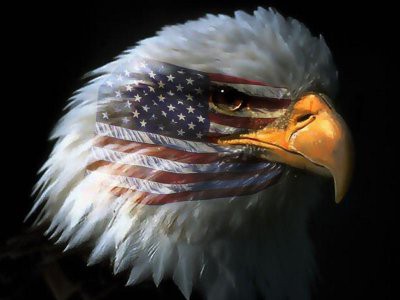
VigilanceVoice.com
v
Wednesday- March 13, 2002—Ground
Zero Plus 183
The Eternal Eye Of Vigilance
by
Cliff McKenzie
Editor, New York City Combat Correspondent News
GROUND ZERO, New York City,
Mar. 13--Vigilance comes in degrees. Or so I learned from
a good, dear friend. It also has an eternal vigilant eye, one that
sees most clearly through a camera lens.
Day before yesterday, I sent my friend, Emily, a
copy of my story on September 11. Its focus was to memorialize the "Unsung Heroes" of
Nine Eleven. Her brother, an international war
correspondent/photographer, had been the only journalist killed at the
World Trade Center--a hero with a camera. I wanted her to know I was thinking of him.
Her e-mail response deepened my understanding of
Vigilance. It was:
"The cost of freedom is eternal
vigilance......even when it costs and hurts."
The words "eternal vigilance" had an impact.
They reminded me that Vigilance is composed of degrees,
that it can be modified to expand or contract its essence--
"Minor Vigilance," or "Extreme Vigilance," "Occasional Vigilance" or
"Eternal Vigilance"
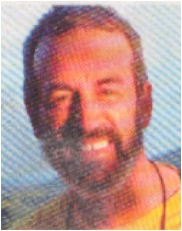 |
|
Bill Biggart |
Emily, I realized, lives in a world of Eternal Vigilance.
She was sent there by the death of her brother who rushed down
to Ground Zero immediately after the attack and was killed taking
pictures of human beings sacrificing their lives and safety
for other human beings.
Emily and I had been
together on the morning of September 11 when the first plane
hit the Twin Towers. We were sitting at Starbucks
in the East Village enjoying our morning coffee and talking
before she went to work and I began my daily routine of writing.
It was a sunny, cheerful morning when the Beast Of Terror
decided to vomit on American soil. I threw my laptop
into my pack and told her I was going down to Ground Zero to
record history. She gave me a big hug and told me to be
careful and that I was crazy. I just smiled at her.
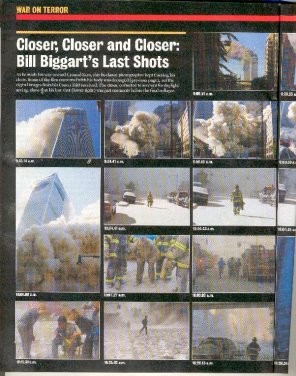
What
either of us didn't know was her brother, Bill Biggart, was
heading in the same direction--loading up his cameras, rushing
down to the World Trade Center epicenter to shove his lenses
in the faces of the firefighters, rescue workers and civilians,
preserving moments of heroism and horror, recording the legacy
of human sacrifice and courage that spontaneously arises in
times of crisis. Like so many that day, he was not supposed
to die in combat in Manhattan--his home from the far-off wars
he reported. New York City was his sanctuary where he
embraced family and loved ones. The irony of his death
occurring here was devastating to Emily--to all his loved
ones.
Bill Biggart scoured
the earth in embattled countries taking pictures of man's inhumanity
to man. He provided the world with close up pictures of faces
and expressions that embossed the pain of violence, and perhaps
stirred in all who viewed his portraits of human suffering the
message that it was time to find an end to human destruction.
While at the end
of that horrible day I returned to the East Village; Bill Biggart
didn't. He was buried in the rubble with the firefighters
he was taking pictures of; his camera still filled with
images of pain and suffering, brimming with symbols of selfless
acts of heroism, sparks of glory erupting out of the din of
madness. (above pictures
were shown in Newsweek Magazine in tribute to Biggart).
When I saw Emily the next
day she embraced me. Tears filled her eyes. "God, I'm so
glad you're okay," she gushed. "I worried all
day about you." I thanked her for her concern.
I was as unaware as she was that her brother had been killed
while I lived.
Emily didn't say anything
to me about her brother being missing for a few days. He was
famous for disappearing for days and even months in the heart
of war-torn situations. Emily told me later that one time
he was missing for four months in some embattled country.
Everyone thought he had been killed.. But then he appeared,
cameras full of pictures, disheveled, but alive. She assumed
he was alive, as so many thousands of family members did those
first few days when they clung to hope that their loved ones
might appear.
Then, a few days
later when we met for coffee, she choked out the words-- her
brother was dead. The authorities were able to identify
his fingerprints, confirming his death. They had
retrieved his cameras.
Emily was angry at me and him,
angry at war, angry at Terrorists, at violence.
She couldn't understand why we were so foolish to rush into
the face of death, to stand on the edge of destruction when
we had so many things to live for--our wives, our children,
life itself. I knew she was full of grief at the
loss, at the insanity of Terrorism, at the waste of human life.
I told her it was impulsive act
on my part--to be in the eye of history--to record human events
at one's own risk. I told her as best I could about
the feeling of having bullets whizzing past your ear, or debris
shooting past, and how there was an extraordinary exhilaration
of life amidst the face of death. I tried, unsuccessfully,
to assuage her anger by relating to her some of us were destined
to thrive on being historians of war, and that perhaps there
was some purpose far beyond the risk we took that would help
end unnecessary violence. I told her we were willing to
risk our lives for that mission, and never thought twice about
our own safety in doing so. It wasn't that we were heroes
or courageous, but rather it was our job, our destiny.
She didn't buy my explanations.
"That's insane,"
she admonished. "You have a family, a wife, children,
grandchildren. Bill had a wife, family, children.
How could anything be more important than that?"
I couldn't answer her question.
She was looking at the insanity of walking into the Mouth of
the Beast just to describe its fetid breath, or show its viscera
to the world. It was difficult even for me to understand
my own compulsion to walk into the fires of Hell.
To me, it wasn't a choice. I never thought twice
about the risk. I'm sure Bill didn't either. I never
made a conscious decision to be brave or courageous.
I just acted.
Like Bill, I was, regardless
of my wife and children and grandchildren, a war correspondent--one
who hungered for front-line action. I knew the need
the world had to report war's horror, and to extol the bravery
of those who fought it. Over a hundred combat operations
in Vietnam had engrained in me a need to see history unfold,
to spear it with the tip of my pen. I could not imagine
standing on the sidelines. My job was to taste the grime
and guts of glory so when I wrote about war, it came from the
heart not the head. Anything less would be a copy, a second
generation. There was no Truth in what another said it
was like--there was only Truth in what you saw, felt, experienced
at the moment. The moment lived in your pictures, words,
mind. It was the moment of Truth when the soul of a man
or woman was stripped bare, and all one had was what they were
made of to count on--and that Truth overrode family and friends
and personal security, just as it did the firefighters or police
or emergency workers who saw only saving people and had no time
to consider the danger.
Emily shook her head.
She wouldn't budge. Women have a different viewpoint than
men about life and death. Men have this incredible sense
of invincibility. Women bury their men--they have for
eons. There was no way I could ever convince Emily
that Bill's death was "part of his job."
So when I looked at Emily's
e-mail response--"The cost of freedom is eternal vigilance......even
when it costs and hurts." the words "eternal vigilance"
stood out as never before. I began to see Emily's point
of view.
For those who lost loved
ones in the senseless act of Terrorism on Nine Eleven, Vigilance
has a far deeper meaning than for those who witnessed the horror.
It becomes "eternal." It becomes part
of the marrow of a person's being, not just a memory of an event.
Ordinary Vigilance becomes a gene within the chemistry of a
"family victim" of any tragic event. That gene
flows through every blood cell, it never sleeps, never wears
thin under the pressure of time or loses its power to
ignite feelings of pain and suffering mere observers of the
event can only imagine. As a Survivor of Nine Eleven, I have
as close an understanding as anyone who was there that day of
the idea of "eternal vigilance." But "Victim
Survivors"--those who lost loved ones that day--know it
as a Truth.
That's one of the reasons my wife and
I went down to Ground Zero last night to see what I have called
the Shafts of Vigilance--two beams shooting up into the night
sky. They were lighted by New York City as symbols of
the horror and waste of Nine Eleven and to hallmark the six-month
anniversary of the tragedy.
We walked around the tip of the island,
from Seaport Village to Battery Park City. I took
pictures of the Shafts of Vigilance from various angles--from
City Hall, the Vietnam Memorial, from Battery Park, and,
from a new memorial in Battery Park City.
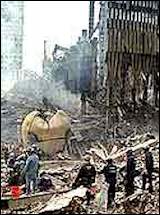 |
As I knelt in front of the battle
scarred Sphere of Peace recovered from the World Trade Center,
I imagined Bill Biggart shooting pictures. I felt his
hands on mine as I lay back on the cold ground, trying to capture
the right angle, getting as close as I could so the picture
exploded to life rather than needing to be cropped, resized,
retouched.
"Bill loved to shove his
camera in the faces of war," Emily told me. "He
didn't use long lenses. He wanted to be right there--so
close you could see the pores on people's faces."
As I struggled for the right
angle, I could see the Spirits of Vigilance rising up into the
night's sky--starting off as two individual beams of light,
and ultimately converging into one. Back in my school
days, I remember someone telling me that infinity was a place
where two parallel lines eventually met. I thought
of the Infinity of Vigilance, its Eternal Nature.
I thought that perhaps one day the pictures that Bill Biggart
took that day might help converge the differences of human beings
into one beam, might cleave the degrees of separation between
Terrorism and Vigilance, might bridge the gap between War and
Peace, Horror and Beauty.
I tried to frame my pictures as Bill
Biggart might have--with an Eternal Vigilant Eye! I figured
he would like that.
(Below is Bill Biggart's
camera and film, recovered from the debris of the WTC)
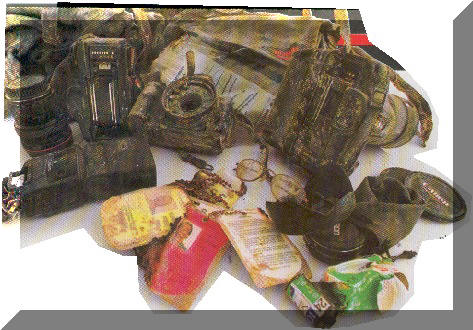

Go To Mar. 12--Unsung Heroes Of
Vigilance
©2001
- 2004, VigilanceVoice.com, All rights reserved - a ((HYYPE))
design

|
|







